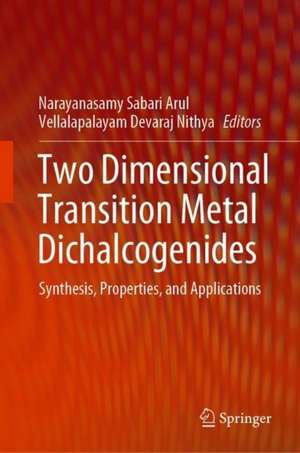Two Dimensional Transition Metal Dichalcogenides: Synthesis, Properties, and Applications
Editat de Narayanasamy Sabari Arul, Vellalapalayam Devaraj Nithyaen Limba Engleză Hardback – 9 aug 2019
| Toate formatele și edițiile | Preț | Express |
|---|---|---|
| Paperback (1) | 890.42 lei 38-44 zile | |
| Springer Nature Singapore – 9 aug 2020 | 890.42 lei 38-44 zile | |
| Hardback (1) | 918.16 lei 38-44 zile | |
| Springer Nature Singapore – 9 aug 2019 | 918.16 lei 38-44 zile |
Preț: 918.16 lei
Preț vechi: 1208.11 lei
-24% Nou
Puncte Express: 1377
Preț estimativ în valută:
175.69€ • 191.44$ • 148.04£
175.69€ • 191.44$ • 148.04£
Carte tipărită la comandă
Livrare economică 19-25 aprilie
Preluare comenzi: 021 569.72.76
Specificații
ISBN-13: 9789811390449
ISBN-10: 9811390444
Pagini: 495
Ilustrații: XI, 355 p. 189 illus., 165 illus. in color.
Dimensiuni: 155 x 235 mm
Ediția:1st ed. 2019
Editura: Springer Nature Singapore
Colecția Springer
Locul publicării:Singapore, Singapore
ISBN-10: 9811390444
Pagini: 495
Ilustrații: XI, 355 p. 189 illus., 165 illus. in color.
Dimensiuni: 155 x 235 mm
Ediția:1st ed. 2019
Editura: Springer Nature Singapore
Colecția Springer
Locul publicării:Singapore, Singapore
Cuprins
Chapter 1: Introduction to Transition metal dichalcogenides.- Chapter 2: Transition metal dichalcogenides: An Overview.- Chapter 3: Preparation methods of transition metal dichalcogenides.- Chapter 4: Properties of transition metal dichalcogenides.- Chapter 5: Simulation of transition metal dichalcogenides.- Chapter 6: Transition metal dichalcogenides for energy storage application.- Chapter 7: Transition metal dichalcogenides in photovoltaics.- Chapter 8: Transition metal dichalcogenides in Electrocatalysis.- Chapter 9: Transition metal dichalcogenides in Sensors.- Chapter 10: Electronic devices based on transition metal dichalcogenides.- Chapter 11: Transition metal dichalcogenides in Photocatalysts.- Chapter 12: Transition metal dichalcogenides in biomedical applications.- Chapter 13: Future Challenges of the Transition metal dichalcogenides.
Notă biografică
Narayanasamy Sabari Arul received his Ph.D. in Nanoscience and Technology from Bharathiar University, Tamil Nadu, India, following which he has worked as a visiting Ph.D. research fellow at Lunghwa University of Science and Technology, Taiwan and Brain-Korea (BK21) Postdoctoral Fellow at Hanyang University, Seoul, South Korea and Assistant Professor in Dongguk University-Seoul, South Korea. His research interests include synthesis of metal oxide nanocomposites and thin films, nanomaterials, quantum dots, perovskites and two-dimensional dichalcogenides for photocatalysts, photovoltaic cells, memory devices, supercapacitors, and electrochemical sensors. He has published more than 45 SCI journal articles and 20 papers in proceedings of international conferences and holds one US and Korean Patent. Dr. Arul also serves as a referee for various journals in Springer, Elsevier, Royal Society of Chemistry and Institute of Physics.
V.D. Nithya received her Ph.D. in Physics from Bharathiar University, Tamil Nadu, India, and had completed her Masters from same University. Her research interests mainly focus on metal oxide nanostructures and their applications for energy storage devices with special emphasis on supercapacitors and Li-ion batteries. She has been the recipient of many awards and fellowships including the INSPIRE fellowship by the Department of Science and Technology, Government of India. She has presented her research work in many seminars and workshops and has published over 20 research papers in journals of international repute.
V.D. Nithya received her Ph.D. in Physics from Bharathiar University, Tamil Nadu, India, and had completed her Masters from same University. Her research interests mainly focus on metal oxide nanostructures and their applications for energy storage devices with special emphasis on supercapacitors and Li-ion batteries. She has been the recipient of many awards and fellowships including the INSPIRE fellowship by the Department of Science and Technology, Government of India. She has presented her research work in many seminars and workshops and has published over 20 research papers in journals of international repute.
Textul de pe ultima copertă
This book presents advanced synthesis techniques adopted to fabricate two-dimensional (2D) transition metal dichalcogenides (TMDs) materials with its enhanced properties towards their utilization in various applications such as, energy storage devices, photovoltaics, electrocatalysis, electronic devices, photocatalysts, sensing and biomedical applications. It provides detailed coverage on everything from the synthesis and properties to the applications and future prospects of research in 2D TMD nanomaterials.
Caracteristici
Provides unified coverage of the synthesis, properties, and applications of 2D TMD nanomaterials Offers both an excellent skylight on modern solid-state chemistry and a gateway to understand the properties and applications of 2D TMD materials Helps readers choose the correct synthesis route, such as chemical and physical methods for desired commercial applications
